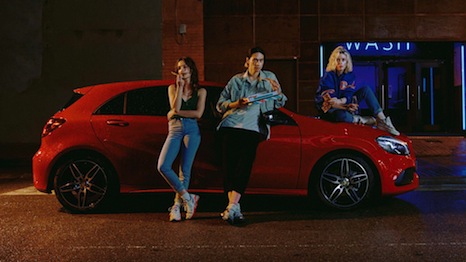- About
- Subscribe Now
- New York,
July 31, 2017

 Four in 10 millennials are planning to buy a car this year. Image credit: Mercedes-Benz
Four in 10 millennials are planning to buy a car this year. Image credit: Mercedes-Benz
Contradicting the depiction of millennials as against car ownership, new YouGov research finds that 40 percent of affluents in this age bracket are planning a vehicle purchase in the next year.
Part of the YouGov Affluent Perspective 2017, a look into this group’s car buying behavior and preferences found that while a quarter of affluent individuals could see themselves ditching car ownership in the future, an overwhelming majority have at least one vehicle today. Affluent consumers may not be trading in owning for sharing yet, but it behooves automakers to be prepared.
"The short-term outlook for luxury automakers looks strong," said Cara David managing partner for affluent perspective at YouGov, Cheshire, CT. "Twenty-five percent of the affluent we survey ($150k+ HHI) are planning to buy a primary vehicle this year.
"But that’s not all―43 of the affluent millennials (18-38) plan to do the same," she said. "This is driven by the older millennials―46 percent of affluent millennials aged 30-38 are in the market to buy a primary vehicle this year.
"Sometimes people forget that millennials aren’t that young anymore–they’re mature adults with mature adult resources and needs."
For its research, YouGov surveyed 5,000 global consumers with incomes in the top 10th percentile.
Buying decisions
The average affluent household owns two to three vehicles. In addition, 97 percent own at least one car, making car ownership a shared trait across the majority of this population.
When car shopping, an average affluent family will pay about $43,000 for their vehicle, while those with incomes of more than $450,000 will shell out $83,000 on a primary vehicle.
U.S. consumers ranked German automakers as the best producers of vehicles, with 35 percent agreeing on their superiority. This ousted Japan, which held the top spot last year and fell to number three.
Audi's Q3. Image credit: Audi
Coming in second was the United States, with 32 percent of respondents giving them the highest marks for their cars. About three-quarters of U.S. affluent consumers like U.S. brands, and 44 percent said they look at U.S. automakers more positively this year when compared to 2016.
Luxury automakers vastly outperform mass-market competitors in measurements of owner attachment and excitement, according to a 2016 study by J.D. Power.
For the 12th consecutive year, German automaker Porsche’s score of 877 out of 1,000 led all brands in the United States Automotive Performance, Execution and Layout (APEAL) Study, with BMW, Jaguar, Mercedes-Benz, Land Rover, Lexus, Lincoln and Audi following (see story).
"There is a growing positive sentiment towards U.S. autos–a 15 percent increase over last year," Ms. David said. "And the sentiment among the affluent to buy American isn’t limited to cars. Fully 76 percent of the affluent simply like brands that are 'Made in America.'
"There’s a movement towards more meaningful consumption, which may be driving this sentiment," she said.
To own or not to own
Much has been made about consumers trading in ownership in the sharing economy. However, YouGov found that 25 percent of affluent consumers are planning a car purchase this year, a statistic that is has not changed since 2016.
However, about a quarter of affluents can see themselves ditching car ownership in the future, with 45 percent of millennials saying the same.
Well-off millennials have largely adopted car sharing or ride sharing services such as Uber and ZipCar, with 76 percent having used these transportation options.
Also, millennials would be more apt to share a car among their friends. While only 17 percent of all affluents say they would split a vehicle with their circle, 46 percent of millennials say the same.
Taking notes from services such as ZipCar, luxury brands have gotten into the on-demand mobility game.
BMW's ReachNow. Image credit: BMW
German automaker BMW extended its commitment to mobility with the new ReachNow brand, which allows the consumer to book via her smartphone a vehicle to be delivered directly to her.
ReachNow, launched in Seattle last year, is the American counterpart to the growing European “DriveNow” brand (see story), offering on-demand mobility to metropolitan dwellers. Supplementing its traditional model with a move into the mobility sector will help BMW remain a major player in the automotive industry among a larger group of consumers (see story).
Ridesharing app Lyft also recently secured a huge investment from Land Rover to the tune of $25 million, suggesting that the relationship between luxury automotive brands and popular ridesharing services could expand.
Land Rover’s investment made up a significant portion of Lyft’s $600 million total funding round. In addition to money, Land Rover will also be supplementing Lyft’s fleet of cars with Jaguar and Land Rover vehicles as well as helping to test autonomous driving (see story).
"The auto industry is not alone in needing to adapt to a future where ownership of high capital investment assets may not be necessary or prudent–cars, yachts, jets, second-homes–are all being challenged," Ms. David said. "As this relates to the affluent and their choices, sentiment is shifting to non-ownership, and it is strongest among current luxury car owners.
"This isn’t a great sign, especially since the affluent have more freedom (resources) to adopt quickly to new ways of managing their assets," she said. "Automakers need to continually test and refine alternative ways of luxury car ownership."
Share your thoughts. Click here